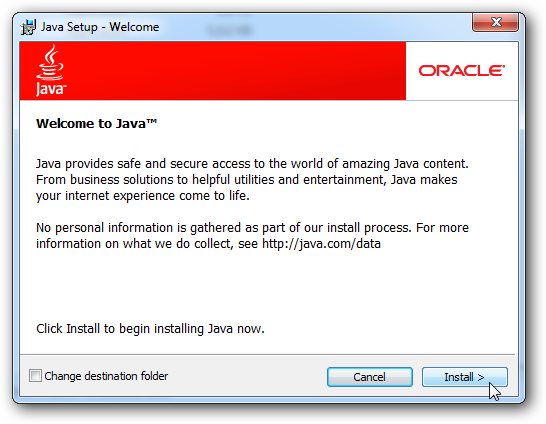

Its sole purpose is the execution or Java bytecode programs that uses a JIT compiler to translate these programs into instructions while caching the code in memory.

The thing that sits at the core of the Java Platform is the Java Virtual Machine. You can also manage the settings of the JRE and access more advanced functions such as Debugging, Java console, Default Java for Browsers, Java Plug-in, JavaFX runtime, JRE Auto-Download or Security. It allows the configuration of network and temporary Internet files settings or security certificates. Oracle's platform also features a Control Panel that can be easily accessed within your computer's (oh, well!) Control Panel. Whether you play online games or chat with your friends, Java is running in the background making sure you have an enjoyable experience. And that happens more often than you may think of. While Java sits patiently on the computer, it instantly acts when called upon.
#Java jdk download vista Pc
The Java Runtime Environment (JRE) brings the Java platform to your PC within seconds from starting the installation process. Behind this highly customizable and powerful platform stands the Java programming language. Java also allows the execution of Web applications and services.
#Java jdk download vista 64 Bit
Java 32 and 64 bit enables developers to create software on one platform (Java Platform) and provide it to users running almost any other platform (Windows, Mac, Linux, Solaris or Unix). If that's not impressive, think of billions of PCs, mobile phones, Blu-ray players, printers, medical devices, car navigation systems, web cams or even lottery terminals. However, these are early-access builds, so they may not be as stable as the final release, scheduled for September 2023, and are intended for testing and feedback purposes.Java is everywhere! Almost every piece of electronic equipment in the world uses Java technologies. SDKMan can be used via the command line, making the process easier for developers who prefer this method. These enhancements would continue to push the boundaries of what's possible with pattern matching in Java, making the language even more powerful and flexible for developers.ĭevelopers who want to learn more can refer to this InfoQ article which shares a comprehensive guide for pattern matching in Java.ĭevelopers who want to experiment with these new features can download the OpenJDK from the JDK 21 Early-Access Builds.Īnother alternative is to use SDKMan, a software development kit manager, to download and manage different versions of Java. Another exciting prospect is the potential for general classes to declare deconstruction patterns, specifying how they can be matched against. There's also the possibility of directly supporting guarded patterns as a special pattern form, allowing for more complex conditional logic within the switch statement. These include the addition of AND and OR patterns, which would provide more expressivity for case labels with patterns. Looking ahead, the OpenJDK team has outlined several potential enhancements that could further expand pattern-matching capabilities in Java. Static String formatterPatternSwitch(Object obj) Ĭase MONDAY, TUESDAY, WEDNESDAY, THURSDAY, FRIDAY -> ("Weekday") Ĭase SATURDAY, SUNDAY -> ("Weekend") Consider the following snippets: // As of Java 21 With JDK 21, this pattern matching has been extended to switch expressions and statements, allowing them to work on any type and permitting case labels with patterns rather than just constants. Consider the following snippets: // Prior to Java 16

This extension simplified the instanceof-and-cast idiom, making it more concise and less error-prone. Pattern matching was first introduced to the instanceof operator in Java 16 (JEP 394), which enabled the operator to take a type pattern and perform pattern matching.

The feature allows patterns to appear in case labels, relaxes the historical null-hostility of switch, and enhances safety by requiring pattern switch statements to cover all possible input values. Pattern matching for switch is a significant leap from the traditional switch statements and expressions. This feature enhances the language with pattern matching for switch expressions and statements. This JEP finalizes this feature and incorporates enhancements in response to feedback from the previous four rounds of preview: JEP 433, Pattern Matching for switch (Fourth Preview), delivered in JDK 20 JEP 427, Pattern Matching for switch (Third Preview), delivered in JDK 19 JEP 420, Pattern Matching for switch (Second Preview), delivered in JDK 18 and JEP 406, Pattern Matching for switch (Preview), delivered in JDK 17. JEP 441, Pattern Matching for switch, has been promoted from Targeted to Completed for JDK 21.


 0 kommentar(er)
0 kommentar(er)
